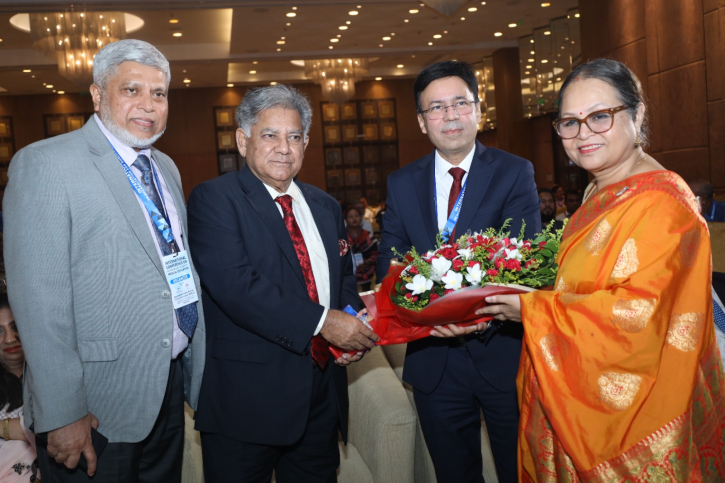
Experts at an international conference highlighted the transformative impact of artificial intelligence (AI) on medical science, noting that innovative devices are now being developed that allow doctors to diagnose diseases more accurately and provide faster treatment.
They emphasized that integrating AI into medical education equips future physicians with real-time data analysis, personalized learning experiences, and improved decision-making skills, ultimately enhancing healthcare outcomes and making medical training more efficient.
These insights were shared during the closing ceremony of the two-day-long international conference on “Accreditation for Quality Medical Education,” organized by the Bangladesh Private Medical College Association (BPMCA) at the Hotel Intercontinental in the city on Monday.
The experts noted that AI is revolutionizing the healthcare industry, significantly changing how doctors diagnose, treat, and manage diseases. One of AI’s most critical contributions to healthcare is through machine learning algorithms that can analyze vast amounts of patient data, including medical records, diagnostic images, and genetic information, allowing for more accurate diagnoses of complex diseases such as cancer, diabetes, and heart disease.
Brigadier General (Retd.) M. Sakhawat Hossain, Adviser to the Ministry of Textiles and Jute and the Ministry of Shipping of the Interim Government, attended as the chief guest at the closing ceremony. Md. Sarwar Bari, Secretary of the Health Education and Family Welfare Department; Prof. Ricardo Leon Borquez, President of the World Federation for Medical Education (WFME); and Park Yongsik, Ambassador of Korea to Bangladesh were present as special guests.
In his remarks, Brigadier General (Retd.) M. Sakhawat Hossain acknowledged AI’s undeniable impact on healthcare, noting that it is redefining diagnostics and treatment and urging that its potential be fully embraced as technology continues to advance.
Md. Sarwar Bari, Secretary of the Health Education and Family Welfare Department, remarked that AI is one of the most discussed topics globally today, radically altering the world’s dynamics and influencing how people think. While AI was initially adopted by technology companies, its use has expanded into various sectors, including healthcare. He highlighted that young entrepreneurs in Bangladesh are spearheading AI adoption, and it is also being used in both the private and public sectors.
A panel discussion on “Excellence in Education and Accreditation in Medicine” took place during the first half of the closing day, where WFME President Prof. Ricardo Leon Borquez presented a keynote paper.
Among the speakers were Professor Dr. Iffat Ara, Bardem’s Director General Professor M.K.I. Qayyum Chowdhury, and Professor Dr. Saria Tasnim.
In the second session, Dr. Nasir Mohammad Uddin, visiting professor at the University of South Florida, delivered a presentation, while Dr. Mohammad Moniruddin conducted a live demonstration.
Other notable participants included Professor Dr. Mohammad Mahfuzul Islam, Professor Dr. Rajesh Palit, Society of Surgeons President Md. Feroze Quader, AME Bangladesh Vice President Prof. Dr. Manzar E. Shamim, and Secretary General Professor Dr. Kazi Khairul Alam.
During the first scientific session, Prof. Somchai Yongsiri, Associate Director of the Institute of Medical Education in Thailand, spoke on “68 Years of Medical Education Policy in Thailand.” Meanwhile, Professor Indika Mahesh Karunathilake, Head of Medical Education at the University of Colombo, Sri Lanka, addressed the role of technology in establishing Continuing Professional Development (CPD) for doctors in South Asia.
In the second scientific session, Prof. Titi Savitri and Prof. Dr. Avinash Supe delivered presentations in separate seminars.
DGME Director General Nazmul Hossain and DGME Director (Medical Education) Professor Dr. Md. Mohiuddin Matubbar also spoke during the closing portion of the scientific session, alongside principals and teachers from various medical colleges.
The event concluded with a cultural program following the closing ceremony.
It is notable that around 450 doctors and professionals from seven countries participated in this two-day-long conference.
During the inaugural ceremony, medical industry entrepreneurs called for ensuring world-class accreditation to further advance medical education. For more information about this conference visit- http://www.ica2024.org/

.png)







